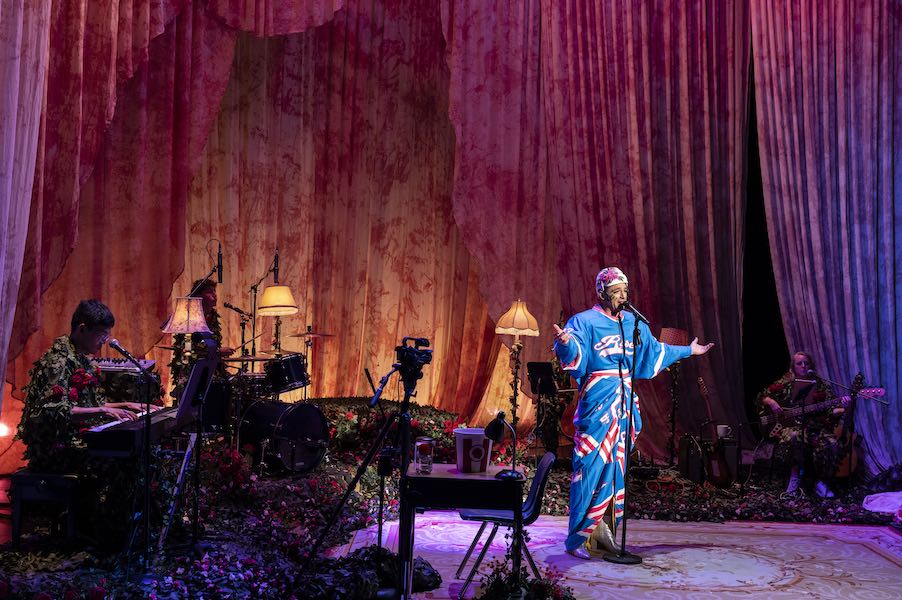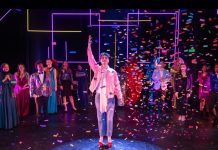June is National Rose Month. It is also Pride Month. And behold, there now cometh in this month of Pride and Roses one John Jarboe (she/her) with the daring, extravagant, and deeply comforting concoction that is Rose: You Are Who You Eat, now playing at Woolly. The words play or theater piece fall short in capturing the intent and effect of this heroic enterprise.
We have come through recent years of a rise in violence against non-white people and trans people, the undermining of a woman’s right to make decisions about her own body, the almost intentional disaster of COVID, the undermining of voting rights for Black Americans, and seeming acceptance of fascism as a viable way of living as we head into the next presidential election. The insult to our humanity remains a daily gauntlet we run. So I was surprised when, after experiencing Rose, I noticed how joyful and hopeful I felt.

The show, under the focused directorial hand of MK Tuomanen, is a grand example of the tradition of cabaret as it is practiced in Europe, as a fusion of genres. Original songs are threaded together around monologs. And there is no fourth wall. Giving us part stand-up comedy, part confessional, and part community sing-along that crosses the boundary where a fourth wall would be.
We learn that when John “came out” to her aunt as trans, her aunt responded by saying, “You know, John, you had a twin in the womb. You ate her. That’s why you are the way you are.” Through monologs and original songs, John Jarboe explores the story of how that revelation began to suggest an explanation for some of the ongoing mysterious longings and curiosities that had permeated her life up to that point. She walks us through what the interior of the womb looked and felt like, how it functioned, the competitive positioning of the siblings in the womb, the squishy or crunchy textures of the sibling as she was devoured. It is that grisly and unsettling. And every bit of the way it is campy, hilarious, heartbreaking, and breathtaking, often at the same time.
This production constantly reminds us just how theatrical theater can be in the hands of practitioners who know and respect its history and potential and malleability. John and her collaborators are respectful of and practiced in the traditions of such American icons as John Vaccaro, Charles Busch (Psycho Beach Party and Vampire Lesbians of Sodom), and Charles Ludlam’s Ridiculous Theatrical Company (Mystery of Irma Vep). For these theater practitioners, what others might call “too much” was just a threshold to a world we have yet to allow to exist. The same is true in Jarboe and company’s production.
Take for example, the set decoration (scenic and video design by Christopher Ash). Under normal circumstances, the design of this show would seem excessive: There are roses everywhere. And when more roses are produced, it’s never just a hundred rose petals, it’s always more like a thousand. A huge multilayered backdrop has a rose (sometimes seeming like a vagina) imprinted on it, while other images are projected onto it at different times. The four band members are dressed as rose bushes with lush greenery and an abundance of rosebuds cascading down their bodies (costume design, Rebecca Kanach. The band is positioned between this backdrop and a scrim that can be opened and closed for an added air of mystery and surprise. John’s performances of the songs (composed by Emily Bate, John Jarboe, Daniel de Jesús, Pax Ressler, and Be Steadwell) are bold and the band’s vocal and instrumental contributions are more collaborative than merely supportive and just as strong, each musician being accomplished in their own right (guitar, Emily Bate; keys, Yifan Huang; cello, Daniel de Jesús; and drums, Mel Regn). You might think of the Miles Davis Kind of Blue personnel to get an idea of the skill, commitment and assertiveness of this crew.
And then there is the wordplay! The description of the show begins: “Once upon a vine, John Jarboe’s aunt revealed that John not only had a twin sister in the womb, but that John consumed her. That was a lot for John to swallow.” The monologs are riddled with such punning wordplay. It seemed to me that these puns with their double/multiple/unstable meanings mirror in a way some feeling of the multiple possibilities of gender.

Rose is relentlessly entertaining. In addition, the show provides a space in which everyone in the audience gets to experience the mutuality of being seen as fully human. In an interview, Jarboe talks about the presence she intends to have after each performance: “We’ll have lemonade talkbacks. I will be out in the theater lobby after every show, offering hugs and hanging out with people.” This is ministerial language. And, in fact, the entire production including the accompanying installations can be seen as a ritual in which we are given the opportunity to practice belonging: giving clothes that no longer fit and/or getting clothing that accurately reflects our experienced selves and for free! Gathering around a TV together in a living room to watch a reimagining of The Sound of Music! Singing along with John and the ensemble! “It doesn’t need to be a literal idea of cannibalism. ‘Who did you eat to become who you are’ is a question that I really want to welcome people into.”
Maybe this excessiveness is a form of resistance: a way of daring to imagine and practice a different way we could be in the world. As if insisting that “we will see ourselves.” As Cornel West put it: “We’re going to attempt to create new possibilities based on visions that become contagious to allow us to engage in heroic actions always against the odds no guarantee whatsoever. That’s hope.”
Eating of one’s twin, while a real and true thing in itself, is also an apt metaphor for a kind of radical empathy. Rose: You Are Who You Eat is the heart of a larger project that is made up of three other components: installations and exercises that are warmups to the radical empathy that we are invited to experience in the theater. (You don’t have to see the staged production in order to participate in these components.)
Component #1 is an immersive exhibition entitled The Rose Garden: Green Room that is filled with video, music, and items to “stimulate a light-hearted and sentimental connection to the memory of Rose,” John Jarboe’s twin, whom, Jarboe informs us, she consumed in utero when they were both fetuses. Cultural DC deserves major appreciation for its support for The Rose Garden: Green Room (a mobile art gallery located just outside Woolly at 7th and D Street, in front of Oyamel; for hours and more information click here).
Component #2 is Rose’s Closet – Pick a Gender, Leave a Gender. Here visitors can participate in a free clothing exchange. You are invited to take what you need and donate what you don’t. For free!
Component #3 is called Write a Letter to Your Gender. A safe space, paper, and writing utensils are provided for you to write your reflections of your “experiences in whatever body or identity you experience.”
The most pointed practice of belonging, empathy, and affirmation that takes place in Rose may be a call-and-response that happens toward the end of the show:
John: You
Mom: I
John: You love me.
Mom: I love you.
John: I’m worthy
Mom: You’re worthy
John: You will change for me.
Mom: I will change for you
John: You will change for me
Mom: I will change for you
John: You will change… [Pause] It’s okay Mother — baby steps.
Running Time: 75 minutes with no intermission.
Rose: You Are Who You Eat (presented by Woolly Mammoth Theatre Company in association with CulturalDC and the Washington Blade) plays through June 23, 2024, at Woolly Mammoth Theatre Company, 641 D St NW, Washington, DC. Tickets ($60–$80, with discounts available) can be purchased online, by phone at 202-393-3939 (Wednesday–Sunday, 12:00–6:00 p.m.), by email ([email protected]), or in person at the Sales Office at 641 D Street NW, Washington, DC (Wednesday–Sunday, 12:00–6:00 p.m.).
The program for Rose: You Are Who You Eat is online here.
COVID Safety: Masks are optional in all public spaces at Woolly Mammoth Theatre Company except for two MASK-REQUIRED PERFORMANCES: Sunday, June 16, at 2 PM and Tuesday, June 18, at 8 PM. Woolly’s full safety policy is available here.
Rose: You Are Who You Eat
Conceived, Written, and Performed by John Jarboe
Directed by MK Tuomanen
CAST
John/Rose: John Jarboe
MUSICIANS
Guitar: Emily Bate
Keys: Yifan Huang
Cello: Daniel de Jesús
Drums: Mel Regn
CREATIVE TEAM
Music Director/Composer: Emily Bate
Production Supervisor: Molly Prunty
Scenic & Video Designer: Christopher Ash
Lighting Designer: Kate McGee
Costume Designer: Rebecca Kanach
Sound Designer: Taylor Jedlinski
Original Production Stage Manager: Nic Labadie-Bartz
Production Manager: Brian Freeland
Additional Dramaturgical Support: Sally Ollove
Composer: Emily Bate
Composer: Daniel de Jesús
Composer/Score Supervisor: Pax Ressler
Composer: Be Steadwell
SEE ALSO:
John Jarboe on her gender journey in ‘Rose: You Are Who You Eat’ (interview by John Stoltenberg, June 12, 2024)
Woolly Mammoth to present wildly queer ‘Rose: You Are Who You Eat’ (news story, May 24, 2024)




